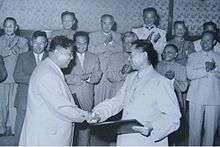Sino-North Korean Mutual Aid and Cooperation Friendship Treaty
| Sino-North Korean Mutual Aid and Cooperation Friendship Treaty | |||||||||||
| Chinese name | |||||||||||
|---|---|---|---|---|---|---|---|---|---|---|---|
| Simplified Chinese | 中朝友好合作互助条约 | ||||||||||
| Traditional Chinese | 中朝友好合作互助條約 | ||||||||||
| |||||||||||
| Korean name | |||||||||||
| Hangul | 중조우호협력상호원조조약 | ||||||||||
The Sino-North Korean Mutual Aid and Cooperation Friendship Treaty was a treaty signed on July 11, 1961 between North Korea and the People's Republic of China.
Signing

The treaty was signed in Beijing and came into effect on September 10 of the same year.[1][2] Premier of the People's Republic of China Zhou Enlai and President of North Korea Kim Il-sung signed for their respective countries.[3] The treaty generally promoted peaceful cooperation in the areas of culture, economics, technology and other social benefits between the two nations.[3] Specifically, Article 2 of the treaty declares the two nations guarantee to adopt immediately all necessary measures to oppose any country or coalition of countries that might attack either nation.[4]
The treaty is in effect and automatically renews every 20 years. It has renewed in 1981 and 2001.[3] The most recent renewal will remain in effect until the year 2021.[5]
Kim Il-sung arrived in Beijing in 1961 to sign this treaty just a few days after the signing of the North Korean-Soviet Mutual Aid and Cooperation Friendship Treaty (朝苏友好合作互助条约).[3] The Soviet treaty however has no longer been in effect since the 1990s, only a revised "consultation" treaty was re-adopted in 1999.[4] The right to cancel can be invoked at specified 5 year intervals, and each party must give advance notice of one year.[4]
See also
References
| Wikisource has original text related to this article: |
- ↑ Cpc.people.com.cn. "Cpc.people.com.cn." 1961年7月11日 《中朝友好合作互助條約》在北京簽訂. Retrieved on 2010-05-30.
- ↑ CCTV.com. "CCTV.com." 中朝兩國關係發展的新契機. Retrieved on 2010-05-31.
- 1 2 3 4 Big5.ifeng.com. "Big5.ifeng.com." 鴨綠江水靜流淌:中朝60年紀事. Retrieved on 2010-05-30.
- 1 2 3 Harrison, Selig S. [2003] (2003). Korean endgame: a strategy for reunification and U.S. disengagement. p 322.
- ↑ Sina.com. "Sina.com." 兩韓緊張升級 中國角色難演. Retrieved on 2010-05-30.